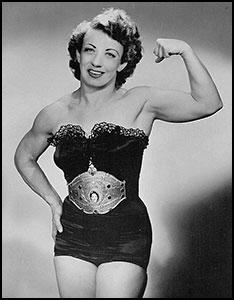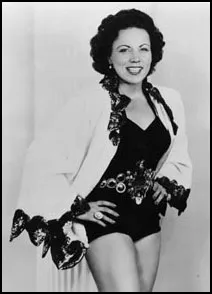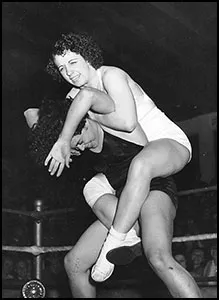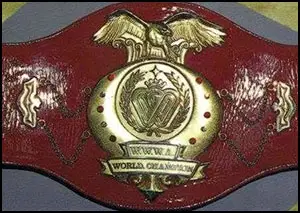August 20, 1954, Atlanta, Georgia
On a hot Atlanta night in 1954, perhaps the most pivotal match in the century-long history of women’s professional wrestling takes place when the iconic World champion Mildred Burke faces her #1 contender, June Byers. The legendary encounter was truly a drama-filled affair and marked the last time that a major professional wrestling World championship was decided in a legitimate contest. Yet, despite the fact that the match was, from bell to bell, a complete shoot, its conclusion also involved one of the sport’s most infamous double-crosses. Indeed, time has shown that the outcome of Burke vs. Byers would, more than any other individual event in history, shape women’s professional wrestling in both the U.S. and Japan. Ultimately, the controversial match directly led to the creation of the All Japan Women’s Pro-Wrestling Association as well as opening a route for The Fabulous Moolah to one day take over the world of women’s wrestling.
By 1954, Mildred Burke had been wrestling’s undisputed Women’s World champion for sixteen of the previous seventeen years and her husband, Billy Wolfe, was the most successful promoter of female wrestling in the world. However, their marriage was plagued by a long, chaotic history of abuse and infidelity and while their partnership took them to the top professionally, it also sunk them to the bottom personally. Following a particularly violent episode in the parking lot of a grocery store, Burke filed for divorce in 1952, irreparably splitting the wrestling business’ most powerful couple. Although Billy Wolfe was a member of the NWA, Mildred Burke, being a female, was unable to join the fraternity of owners and promoters. However, following their divorce, it was decided by the Alliance that Burke would be allowed to buy the exclusive rights to the Women’s World title from her crafty former husband for the lofty sum of $30,000 ($292,000 in 2020 currency). The agreement also forced Billy Wolfe to sign a contract stating he would refrain from promoting women’s wrestling for a period of five years. Wolfe, of course, had absolutely no intention of abiding by the contract and, very quickly, he began promoting his troupe of lady wrestlers while continuing with his plan to get the belt away from his ex-wife and around the waist of his new top star, and latest paramour, Nell Stewart.
When the National Wrestling Alliance gave Wolfe the go-ahead to stage a tournament in Baltimore on April 14, 1953, that was designed to crown a new Women’s World champion, the actual champion, Mildred Burke, immediately sent a telegram to the Baltimore Sun, informing the newspaper that the results had already been determined and that Stewart would be winning the tournament. Wolfe, in turn, countered by flipping his plans and having another one of his top protégés, June Byers (who was also his daughter-in-law) come out on top of the tournament. By this point, the Alliance had grown tired of the never ending drama between Burke and Wolfe and rather than aid the longtime champion, the NWA members instead decided to officially forego the regulation of women’s wrestling altogether. Eventually, after much effort, Wolfe was able to secure a title match for June Byers and he was determined, by any means necessary, to make sure Burke did not walk out of the ring with her championship reign intact. Wolfe was successful in this goal and on August 20, 1954, in one of the most controversial matches in the history of women’s wrestling, Mildred Burke’s sixteen years as the undisputed Women’s World champion came to an end.
The match, which turned out to be a complete shoot, was scheduled to be a two-of-three falls bout. However, after an injured Burke lost the first fall via submission, Wolfe’s hand-picked referee declared that the match was over and raised Byers’ arm in victory. Since June Byers had won only one fall, Burke felt her championship claim was safe. She was wrong. Billy Wolfe made sure that the local press touted Byers’ title victory and successfully petitioned the NWA to recognize her as the new World champion, both of which damaged Burke’s claim to the title tremendously. While a small handful of matchmakers remained loyal to her, Mildred Burke soon found herself ostracized by the majority of U.S. promoters, essentially blackballed, ensuring that she was unable to find steady work. Having seen the writing on the wall, Burke created the Los Angeles-based World Women’s Wrestling Association just prior to her showdown with June Byers and, following the controversial loss, she continued to train new female wrestlers while overseeing the WWWA and serving as its World champion. Viewed as an “outlaw” promotion by the NWA’s members, Burke’s WWWA was forced to create its own roster of talent and stage its own cards with little to no help from outside sources.
After losing the controversial match to Byers, Mildred Burke left the U.S. for a tour of Japan, billing herself as the undefeated, undisputed Women’s World champion. These matches overseas proved to be very successful with the Japanese public, planting the seeds for the future of women’s wrestling in that country. Burke’s tour led to the creation of the All Japan Women’s Pro-Wrestling Association in 1955 and, in 1970, AJW bought the rights to Burke’s prestigious World title. Meanwhile, in America, Lillian Ellison (The Fabulous Moolah) took advantage of the void left by Burke’s ongoing professional ostracism and Wolfe’s death in 1963. By following the trail that was blazed by Burke & Wolfe and incorporating many of the promotional tactics that they developed together, Ellison then emerged as the primary promoter of women’s wrestling in the United States for the next twenty-five years.





